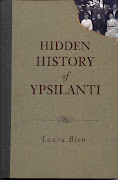Kind readers may remember that
2 Saturdays ago I decided to try a settler-era method of food preservation: the dill crock. The clean crock was filled with raw veggies and a brine solution, and weighted down with a plate upon which sat a gallon jug of water. The crock sat on our kitchen counter for 2 weeks, at room temperature.
I was a little frightened of this craft. What if I opened it up and found a big, black, slimy....errrghhhh!!! What if I got sick from eating something that had sat around for 2 weeks?
Before opening the crock today, I felt a little better when I found out that this
exact same method of vegetable preservation was used by 19th-century Michigan settlers.
[Um, Dusty, these were the same folks who used the open-kettle canning method; just a thought. --ed.] Here is an excerpt from U. P. Hedrick's "The Land of the Crooked Tree." The book is "an exuberant recall of pioneer life on the northern tip of the lower peninsula of Michigan, begun when the author's family migrated there in 1874."



Here's the crock sitting on the counter. Time to take off the bag and peek inside.

When I took off the bag, I saw the brine was pink!--probably from the carrots. I leaned in and took a big sniff.
WHOA NELLIE! It smelled TERRIBLE, like angry mold. Oh, God. Did I just waste a whole crock's worth of nice vegetables? Gahh! I gingerly lifted out he submerged plate with a spoon, dreading what I might see.

Wow. Looks good! The fresh-looking veggies are floating in brine.
Then I got aholt of myself a bit more. I noticed that it was the scum around the edge, on the lip of the crock, that smelled so bad. I carefully wiped it off with a clean sponge. Hm. That was better! The scum is a natural part of the process. It forms on the surface of the brine, but because of the brine, does not penetrate to the veggies safely down below. I did skim it off a couple of times over the two weeks with a spoon, and also with a coffee filter, neither of which worked too well--but for true pioneer types you don't have to.

Now comes the true test. Tasty delight or hospital visit? "Honey!" I called sweetly. "Would you like to try those pickles?" I scooped up a few with a strainer and rinsed them briefly under the tap.
"Mmm!" my husband said. "These are good! Can I have a few more?" I scooped and rinsed a few more. Hubby scooted off to enjoy his bowl of mixed pickles while reading.
I observed him quietly from the kitchen door for a scientific amount of time. Skin color: normal. Respiration: normal. Palpitations, palsy, clutching of throat: none.
I approached sweetie's bowl and gingerly picked up one cauliflower floret. I examined its light pinkness. It looked fine. Bite.
Oh boy. This is GOOD. Salty and crisp, with just a tinge of hot pepper at the end and a richness of garlic and dill. Tried a carrot. Crispy and salty-sweet. Tried a garlic clove. Oh my, was that nummy: mild, garlicky, and crunchy-juicy. This was the real deal--the mixed pickles I'd loved so much as a kid.
So now we have a whole crockful of them chilling in the fridge, ready as a cool, crisp, salty snack or side dish at any time. What a time saver! And a money saver...AND it satisfies the Hundred-Year Rule!
It's also really empowering to me. I feel great making, not buying, food, and the list of foods we make is becoming substantial:
1. All our bread and cookies, &c.
2. Yoghurt (gallon at a time)
3. Farmer's cheese with herbs
4. Mixed pickles
5. All soups, gravies, sauces, and stocks--no canned soup or gravy packets here!
The "Crooked Tree" book also had a description of making sauerkraut that is similar to the dill crock. With cabbage at 50 cents a pound, I am now excited to try this next, once I get a new crock, likely from Value World. In the meantime,
hooray for mixed pickles and for the pioneers who made 'em and et 'em long ago!
 Tarnation! Take a gander at Dusty Diary's latest water bill from the YCUA. This August's water consumption is a measly 1/5 of what it was last August!
Tarnation! Take a gander at Dusty Diary's latest water bill from the YCUA. This August's water consumption is a measly 1/5 of what it was last August! 



















































